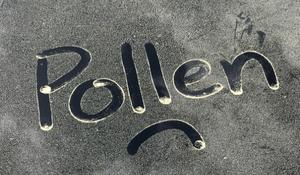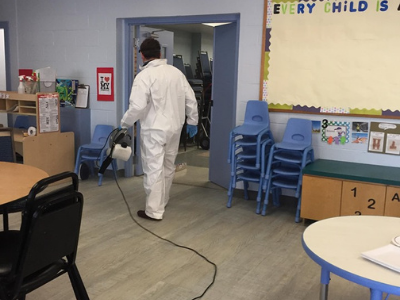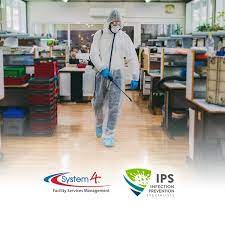Are Pollen Levels Getting Worse?

Your workplace leaves you frustrated after a quick glance. Everything seems to be covered in dust. However, is it really dust or is it pollen? In most cases, if your car is pollen-covered, so is your office. Did your janitors neglect their duties?
In most cases, the problem is not the janitorial staff. The issue is probably your cleaning frequency. Pollen levels are rising across the nation. It's hard to keep up with the increasing pollen, so it appears that your cleaning crew is neglecting to dust. Cleaning weekly, biweekly or monthly may not keep up with what Mother Nature dishes out.

Are pollen levels getting worse?
Did you know that pollen season is 19 - 20 days longer and arrives 40 days earlier? Pollen concentrations across the United States have risen 21% because of warmer temperatures. Much to the dismay of allergy sufferers, a recent study says it could get even more intense by the end of this century. Curious about your local pollen forecast? Have you tried to figure out why there is so much of it at your workplace? Get your own histogram based on your zip code.
Listed below are the common pollen seasons:
March through June is tree pollen season.
June, July, and August is usually when the grass pollens are high, sometimes into September in a warm year.
August through the end of October is weed pollen season.

Unhealthy indoor air quality results in lost productivity and higher costs
A hot topic in human resources and facility management is air quality. In a recent study, 6 in 10 employees will resign due to poor air quality if their employers refuse to create a healthier indoor workplace environment. The pandemic exposed the importance of a clean workplace. This includes not only restrooms, but also the air occupants breathe.

'Sick Building Syndrome' is a condition, where prolonged stay in an unsafe building causes adverse health effects without a clearly defined cause, as well as frequent migraines.
Health problems related to poor indoor air quality can negatively impact not only employee wellness, but also the environment in the office, resulting in well-being and productivity issues, as well as a heavy financial burden: one study indicates that flu-like illnesses alone cost the US economy up to 111 million workdays per year; migraines, meanwhile, have an indirect cost of $19.3 billion for absenteeism alone.
Even when poor indoor air quality does not directly affect an employee's health, performance can be negatively affected. In one Harvard study, people exhibited slower response times and output in low-quality environments.

How to deal with pollen dust at work:
If employees and customers are itching, sneezing, and lethargic, or if sick days are piling up, it may be time to call your cleaners. There are steps you can take to minimize the impact of pollen in your office.
Here are a few tips for dealing with office allergies:
✔️ Close windows
✔️ Wipe down surfaces with disinfectant wipe
✔️ Vacuum using a mask
✔️ Change air filters frequently
✔️ Increase cleaning frequency to stay ahead during pollen season

An estimated 50 million Americans suffer from allergies every day, making them the fifth most common chronic disease in the United States. Coping with allergies at work can be challenging. A stuffy nose, itchy eyes, and a shortness of breath caused by frequent sneezing make it difficult to stay focused on business. It's miserable, and our System4 IPS team wants to help you feel better.
Common Workplace Allergies
Whether you work at an office, warehouse, retail establishment, factory or any other place of business, you are likely to suffer from indoor/outdoor allergies, otherwise known as seasonal allergies. Contact allergies, such as an allergy to latex and eye allergies, are also common. A common workplace problem is occupational asthma, which develops when workers have an allergy to something they usually inhale (e.g., fumes, chemicals).

The take-away:
The awareness of air quality continues to grow, making it crucial to constantly improve your workplace environment. Pollen season is in full swing, so staying ahead of the yellow dust is essential. Implement the suggested tips and make improvements to ensure high productivity and employee retention. Several industries, including janitorial, are facing staffing shortages. It's best to call your cleaning provider well in advance if you'd like to increase your cleaning frequency during pollen season, which runs from April to October in the Northeast.

Wondering about increased cleaning for your workplace? Here’s a comprehensive study that shows exactly what workers are saying about cleanliness.
Lacking janitorial staffing
Concerned about a staffing shortage and whether you are using the right cleaning service for your workplace? It's not too late to find the perfect janitorial team that will keep your workplace clean and safe. Look for solid custodian referrals and consult with System4 IPS.

Which custodian or janitorial team is best for you? System4 IPS specializes in creating customized janitorial programs that meet the unique need of businesses like yours!
If your workplace experiences a singular COVID-19 positive case or outbreak, call System4 IPS and schedule your disinfection service today. Our professional team listens to your needs, requirements, and timing. See our many satisfied customer testimonials and public Google ratings.



.jpg)
.jpg)